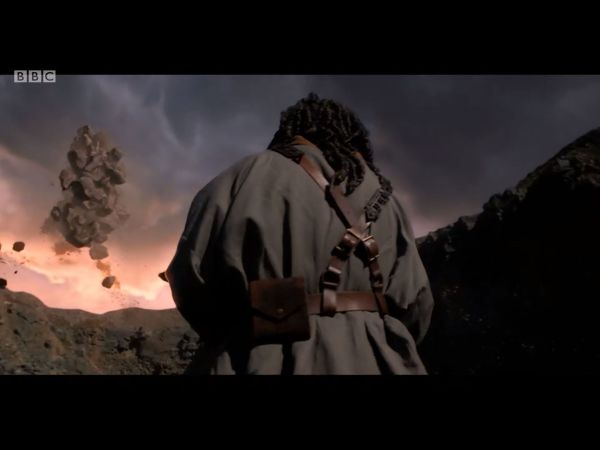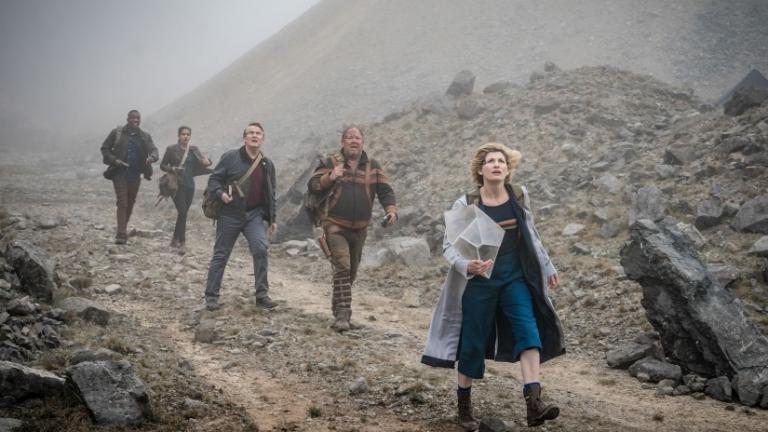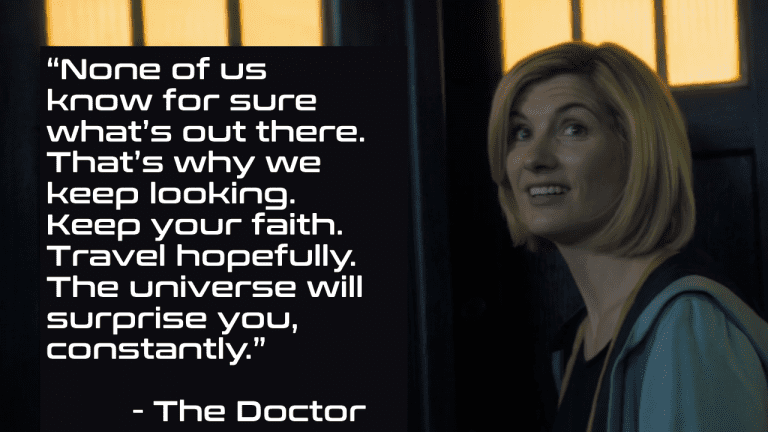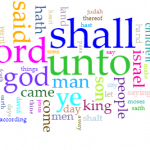The tenth episode of Jodie Whittaker’s first season as the Doctor is the season finale, and its title – “The Battle of Ranskoor av Kolos” – may not be especially memorable or striking. But this episode is certain to be remembered vividly, and widely discussed, by anyone interested in religious themes on the show. It is also going to be a focus of attention for anyone interested in the Doctor’s ethical values and the ways that the show engages with matters of violence and warfare.
The episode introduces us in the beginning to two humanoid beings whose name I believe is spelled Ux. We later learn that there are only ever two of them, and in all her travels the Doctor has never actually met Ux before. These two are named Andinio and Delph. The Ux have impressive powers, an ability to shape the universe through their minds’ psychic power.
The conversation between the two Ux grabbed my attention immediately. Delph appears to be Andinio’s apprentice, and when she says he is ready, that this is what his training has been leading to, he tells her, “You call it training, I call it building doubt. Every lesson that you’ve given me, I feel like I’ve understood less, not more.” She responds by saying that that is the point. “The more we learn, the less we realize we know. This is our faith. This is our existence. The Creator would contend the world is not to be understood, only experienced, and built with our gift.” She then goes on to tell Delph that if he does this, he will shape their world in worship.
Then they are interrupted by the appearance of a figure, who will come to the fore later, and whom we have seen before. But then the action skips ahead slightly – to 3,407 years later. The Doctor is picking up 7 distress calls all from the same planet, and the same area of that planet. That planet, of course, is Ranskoor av Kolos, which we are told means “Disintegrator of the Soul.” The planet apparently can have a confusing effect on the mind, and so the Doctor and her friends wear neural balancers to help ward off this effect. They also give one, upon arriving and finding a survivor, to the commander of a ship they land in , whose name is Greston Paltraki. He is then contacted by one of the Ux, who says that he must return to them – “the Creator commands it.” They hear the voice of the one she refers to as the Creator, and it sounds like Timjaa – aka “Tim Shaw” – of the Stenza, whom we met at the start of the semester. Graham says soon after that if it is Tim Shaw, he will kill him for what he did to Grace. The Doctor in turn tells Graham that if he does that, he can’t travel with her any longer. “If you kill him, you become the same as him.”
A little later, however, we learn that the Doctor has packed grenades and other such things. This was so absolutely in character for the Doctor. She says that her creed is flexible. Walls and doors, things that can be rebuilt, are fair game. Anyone who has watched the show would agree that the Doctor is not committed to avoiding damage – just to unnecessary loss of life, and to saving lives when possible.
I liked when the Doctor said, soon afterwards, “I like precautions, always take precautions, especially when you don’t know what you’re doing.” And I liked her appreciation for Wellington boots or “wellies,” saying that she thinks she may have helped to invent them.
 When the Doctor is first introduced to Andinio of the Uks, she knows them by reputation, describing them as “faith-driven dimensional engineers.” The Creator is the cornerstone of their faith, which has definite echoes of ideas from the Christian tradition, in which humans made in the image of God reflect that image of the Creator precisely through our own creative activity, our involvement as co-creators. And yet it is clear that the Ux have been doing things, asked to do things, that are at odds with their traditional values. The Doctor says to her, “Your words are certain, but your eyes are full of doubt.” That doubt was raised because the Creator recognized the Doctor – but how could that be possible?
When the Doctor is first introduced to Andinio of the Uks, she knows them by reputation, describing them as “faith-driven dimensional engineers.” The Creator is the cornerstone of their faith, which has definite echoes of ideas from the Christian tradition, in which humans made in the image of God reflect that image of the Creator precisely through our own creative activity, our involvement as co-creators. And yet it is clear that the Ux have been doing things, asked to do things, that are at odds with their traditional values. The Doctor says to her, “Your words are certain, but your eyes are full of doubt.” That doubt was raised because the Creator recognized the Doctor – but how could that be possible?
It turns out that Tim Shaw appeared to the Ux just as they were about to build a sort of rock castle in the sky on this world, and hijacked their faith by taking advantage of their willingness to believe that he was the Creator. The Doctor confronts him precisely in religious terms, saying, “You wanted to be a leader, now you’re worshiped as a false god.” Tim Shaw has most of all been seeking revenge against the Doctor, and yet says perhaps he should should thank her. “You have made me a god,” he says, to which the Doctor replies, “You’re nothing of the sort.” Tim Shaw then responds by saying, “I must be god. I have the power of one.” But when he says, “I am unstoppable,” the Doctor responds by saying, “No one’s unstoppable.”
Paltraki says that his original mission had been at the behest of the “Congress of the Nine Planets” in response to the atrocities. Whether this was the more general atrocities of the Stenza, or Tim Shaw’s specific acts, is unclear. But we soon learn that Tim Shaw has stolen whole planets, using the power of the Ux in conjunction with his own Stenza technology to do the seemingly impossible. The Doctor accuses him saying, “You’re breaking every known law of the universe.” Tim Shaw responds by saying, “I’m rewriting the laws of the universe.” This raises important ethical questions in an interesting way. If one has the power to create worlds, to relocate them, and so on, by what authority can someone who doesn’t have that power say that it is wrong, that they “have no right” to do that thing? The power-focused divine command theory approach of some Christians can be shown to be problematic by exploring its application in this story.
When Tim Shaw focuses on Earth, as revenge on the Doctor, the Doctor’s unwillingness to simply kill the Ux in order to stop them from doing what they perceive to be the will of the Creator troubles Yaz. It is their life vs. seven billion others. But the Doctor says, “There’s got to be a way. There’s always a way.” This reminds me a bit of Captain Kirk’s approach to the Kobayashi Maru. Alas, while there are situations in which creative thinking may find an unseen third option that saves the day, sometimes hard choices are unavoidable, and a perfect outcome in which everyone lives happily ever after cannot be attained.
Religious themes are present and given serious treatment in the faith of the Ux and their discussion of the Creator. There are also elements of visual symbolism, and also turns of phrase that it might be easy to miss. Visually, one of the Uks who is actively involved in trying to relocate the Earth into a crystalline holding chamber looks like a Christ figure with his arms outstretched on the machine. Characters also speak about and even to the Universe as though it may itself be a powerful and benevolent entity, a truer god than Tim Shaw. “The universe provides,” we hear at one point, and later from the Doctor we hear an almost prayer-like utterance, “Universe, provide for me, I’m working really hard to keep you together right now.”
The Doctor shows significant pastoral care and theological nuance as she speaks to the Ux, unmasking Tim Shaw for what he is. “That creature took advantage of your faith,” she says. Andinio says, “He is my truth, he was our truth.” The Doctor shows them that they are in fact superior to the one who has hijacked their religious devotion, and that he is not worthy of that devotion. The Doctor says, “You were the creators. But he made you destroyers. That’s no god. I’m sorry.”
 We won’t get into whether the killer robots may have been sentient, and if so how that might change our perception of the episode’s moral message. For now, we can just be happy with Graham making another great movie reference, this time to Die Hard, when he says “Yippee ki-yay, robots,” before detonating explosives and blowing them up. Graham eventually comes face to face with Tim Shaw, and opts not to kill him. When Tim Shaw says he is no warrior, he concurs – but then adds that he is the better man. Graham does end up needing to shoot him in the foot, to protect Ryan more than anything else. Together they put him in one of the stasis chambers that he had been keeping captured crew alive in. They say to him, “As you contemplate eternity, keep one name on your mind: Grace.” When their actions are shared with the Doctor later, Graham suggests that he was “too weak” to kill Tim Shaw. She responds by saying, “Graham O’Brien, you’re the strongest person I know. One of the few.”
We won’t get into whether the killer robots may have been sentient, and if so how that might change our perception of the episode’s moral message. For now, we can just be happy with Graham making another great movie reference, this time to Die Hard, when he says “Yippee ki-yay, robots,” before detonating explosives and blowing them up. Graham eventually comes face to face with Tim Shaw, and opts not to kill him. When Tim Shaw says he is no warrior, he concurs – but then adds that he is the better man. Graham does end up needing to shoot him in the foot, to protect Ryan more than anything else. Together they put him in one of the stasis chambers that he had been keeping captured crew alive in. They say to him, “As you contemplate eternity, keep one name on your mind: Grace.” When their actions are shared with the Doctor later, Graham suggests that he was “too weak” to kill Tim Shaw. She responds by saying, “Graham O’Brien, you’re the strongest person I know. One of the few.”
There are other interesting elements of religious significance. When the Doctor summons the TARDIS, she tells the Ux, “You’re not the only ones who can conjure stuff out of nothing.” She then adds Time Lord technology into the mix to try to send the previously-captured planets back where they came from. She uses the term “Supergroup,” primarily a musical reference, but applicable to any instance of working together, where disparate cultures and perspectives combine forces to accomplish something, lending the best elements of each to the effort. That has potential religious implications both in relation to religions that divide us from others or encourage us to enter encounter others expecting that we have things to learn and not only to teach.
The words of the prayer of Andinio during their final effort is noteworthy: “May the will of the true Creator give me strength.” The addition of true to the phrasing is crucial. It is possible to experience being deceived, and to learn and grow in a manner that doesn’t require simply losing one’s faith. The Doctor, in the most striking moment (other than calling her companions “fam”, perhaps) in the entire episode, encourages precisely this approach to religion, saying to the Ux before leaving in the TARDIS: “None of us know for sure what’s out there. That’s why we keep looking. Keep your faith. Travel hopefully. The universe will surprise you, constantly.” Since that’s a pretty good creed to adhere to (flexibly), I won’t say much more about it, other than to affirm its underlying conviction that ‘keeping the faith,’ and constantly exploring in a way that is open to ongoing surprise, are not only not at odds with one another, they are a natural and healthy positive pairing.
The ethical teaching of the episode, on the other hand, should perhaps give us pause. Chris Allcock writes, “Fifty-five years after William Hartnell considered braining a caveman with a rock, the Doctor has yet to truly come to terms with the idea that a good person can legitimately have blood on their hands, and tonight’s episode really doesn’t help solve the quandary. True, Graham doesn’t kill Tim Shaw, but he does shoot him in the foot to disable him. The guns were as vital here as they were when the Doctor used Wilf’s pistol to prevent Gallifrey’s return. And just like with the spiders left to starve in a vault beneath a hotel, you have to wonder: is condemning the Stenza leader to an eternity buried in a floating rock truly more kind than ending his existence? Or is it just easier to live with?”
This is something that I’ve been wrestling with quite a bit over the past year. I mentioned back in 2012 my idea for a book about living justly, trying to disentangle myself from implication in injustice in the way that I shop, eat, travel, and so on. I realized very quickly that what I had in mind was not feasible. But it took longer for me to recognize that what I initially envisaged might not be just, or most just. If someone goes off to the wilderness to live off the land and have absolutely nothing to do with the oppressive practices that our economy is built on, they also stop engaging with and having any sort of positive influence on that society as well. Is that better? Is it more just? Or does it just make that individual feel like their conscience is clearer, when in fact by being entangled in while struggling to change our society, they might have done more to actually eliminate injustice in the world?
The same can be asked about nonviolence. Might it not be that there could be instances in which nonviolence leaves the individual pacifist with a clearer conscience, but actually permits evil to prevail in ways that they could have prevented if they were willing to get their own hands dirty in order to minimize harm to others?
I take very seriously the Doctor’s statement to Graham. I see all around me people who think they are fighting evil, and they have simply become mirror images of their opponents, perhaps not as bad in terms of what they are fighting for, but every bit as bad in terms of the dishonesty and hatred they are promoting in the process. And so this isn’t a simple either/or, and it is arguably better to take the route the Doctor (and Jesus) teach, than to go to the other extreme.
But doing so while treating that creed as flexible might be best of all.
What did you think of the episode?














